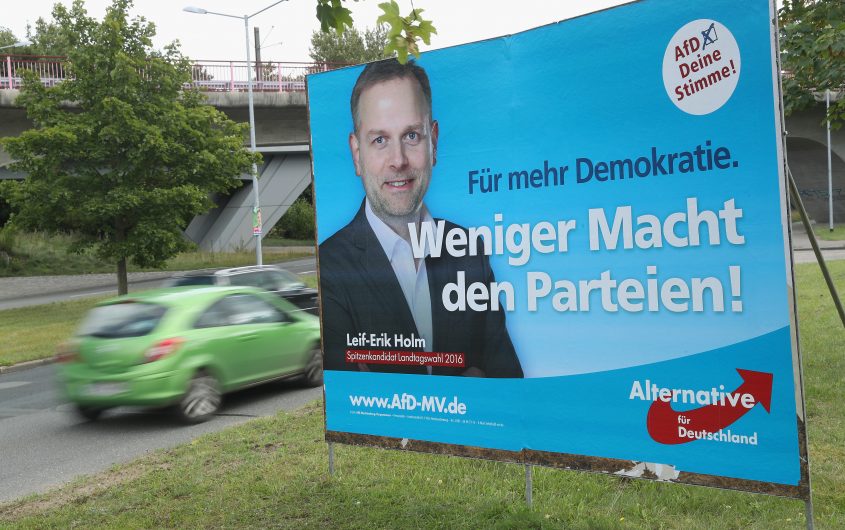
Sean Gallup/Getty Images
The AfD: Germany’s Alternative to What?

Jackson Janes
President Emeritus of AGI
Jackson Janes is the President Emeritus of the American-German Institute at the Johns Hopkins University in Washington, DC, where he has been affiliated since 1989.
Dr. Janes has been engaged in German-American affairs in numerous capacities over many years. He has studied and taught in German universities in Freiburg, Giessen and Tübingen. He was the Director of the German-American Institute in Tübingen (1977-1980) and then directed the European office of The German Marshall Fund of the United States in Bonn (1980-1985). Before joining AICGS, he served as Director of Program Development at the University Center for International Studies at the University of Pittsburgh (1986-1988). He was also Chair of the German Speaking Areas in Europe Program at the Foreign Service Institute in Washington, DC, from 1999-2000 and is Honorary President of the International Association for the Study of German Politics .
Dr. Janes is a member of the Council on Foreign Relations, the International Institute for Strategic Studies, the Atlantic Council of the United States, and American Purpose. He serves on the advisory boards of the Berlin office of the American Jewish Committee, and the Beirat der Zeitschrift für Außen- und Sicherheitspolitik (ZfAS). He serves on the Selection Committee for the Bundeskanzler Fellowships for the Alexander von Humboldt Foundation.
Dr. Janes has lectured throughout Europe and the United States and has published extensively on issues dealing with Germany, German-American relations, and transatlantic affairs. In addition to regular commentary given to European and American news radio, he has appeared on CBS, CNN, C-SPAN, PBS, CBC, and is a frequent commentator on German television. Dr. Janes is listed in Who’s Who in America and Who’s Who in Education.
In 2005, Dr. Janes was awarded the Officer’s Cross of the Order of Merit of the Federal Republic of Germany, Germany’s highest civilian award.
Education:
Ph.D., International Relations, Claremont Graduate School, Claremont, California
M.A., Divinity School, University of Chicago
B.A., Sociology, Colgate University
Expertise:
Transatlantic relations, German-American relations, domestic German politics, German-EU relations, transatlantic affairs.
__
Germany’s election on September 24 will likely bring a new political party to the Bundestag: the Alternative for Germany (AfD). Five years after the party’s emergence, the AfD calls itself an “alternative” for German voters. In reality, it is less an alternative than an “anti-party,” representing the backlash from voters who are energized primarily by the immigration issue and feel alienated from other political parties.
The AfD has achieved a lot in a relatively short time. It is represented in thirteen of the sixteen state parliaments and has had a steady level of popular support nationally—around 7 percent—and particularly high levels of support in eastern Germany. Despite intense political battles among its leadership figures, it has been able to sustain momentum by inciting anxiety about the wave of asylum seekers and concerns about the euro crisis. It does so within a spreading populist wave mixed with ethno-nationalist rhetoric raising fears about the alleged loss of German identity. Where once a party with such a platform would be unable to win 5 percent of the vote and enter the Bundestag, the AfD’s strong showing at the regional level points toward that now being possible.
The AfD is not the only right-wing party in Germany, but any earlier attempts by such parties to gain access to the Bundestag have been stymied by the 5 percent hurdle. This is as much attributable to that institutional barrier as it is to the rejection of right-wing campaign messages by the vast majority of German voters.
But just as many other European countries are having to confront the wave of right-wing populist movements, so, too, is Germany. While tolerance for these groups has been limited by the deeply-rooted trauma of the Nazi era, the emergence of the AfD has offered a new vehicle for right-wing ideologies.
So what might the AfD’s rise mean for Germany’s national political arena in the next four years? If the AfD has a voice in the parliament, it will be a weak one sitting in the opposition seats. Similar to the Left Party, there will be no interest among the other parties to fraternize with the AfD. The party will have a voice in the parliamentary debates and the right to be represented on committees. It will be entitled to public funding of political activities, which will enable the AfD to mobilize voters and members.
Some of the AfD leadership—like party chair Frauke Petry—have tried to steer the party’s message away from extreme right-wing nationalist rhetoric and toward stricter economic policy and immigration controls. Nevertheless, there remain strong voices in the party ranks advocating for and encouraging the highly-charged nationalist fervor.
The two candidates leading the AfD campaign are an odd couple, representing the diverse strands of the AfD as they do. Alice Weidel comes to the party as an economist who once worked at Goldman Sachs and spent years in China. Her counterpart, the far older Alexander Gauland, came up through the West German political system and was a member of the CDU for many years. He eventually grew disenchanted with Chancellor Merkel’s policy with the euro zone and helped to found the AfD, strongly supporting the party’s nationalist message to preserve German sovereignty and identity.
As with Gauland, the AfD has drawn much of its support from disappointed members of the conservative parties—the CDU and the CSU—and the liberal FDP. However, some members from the center-left SPD have been crossing over at the regional level as well. And there is a significant number of previously disengaged Germans who are now attracted to this protest party.
Other parties are trying to win back those voters with emphasis on stricter asylum and immigration controls and tighter economic policies. That the asylum wave has decreased significantly since 2015, in addition to its chaotic leadership struggles, has lessened the AfD’s appeal.
Events elsewhere have highlighted the dangers of the AfD’s nationalist platform. The Brexit vote in the UK was driven in no small measure by the campaign to recover allegedly lost sovereignty and by the fear of immigration. It has exacerbated concerns about the future of Europe, and has emphasized Chancellor Merkel’s key role in managing the crisis to help prevent more backlash against European unity.
In the U.S., the election of Donald Trump has been followed by increasing tensions in American society over similar fault lines. Trump’s personal popularity in Germany is in stark contrast to his predecessor, and the vast majority of Germans see his nationalist messages, his critique of Germany, and specific policy decisions such as withdrawing from the Paris Climate Accord, in very negative light.
The recent turmoil in Charlottesville, Virginia, in which Nazi regalia was paraded through the streets and one person died, was widely covered in Germany and roundly critiqued. Indeed, Chancellor Merkel commented publicly, saying that it was “racist,” “horrifying,” and “evil,” and called for far-right violence to be condemned worldwide.
Whether German voters see the platform of the AfD reflecting these trends on either side of the Atlantic remains to be seen.
In contrast to Trump’s sinking approval rating, the chancellor currently enjoys a strong lead in the polls. She does not need to cater to AfD voters.
The day after the election will reveal whether the AfD has enough support to be represented in the Bundestag as a party. Yet regardless of the results in Berlin, its strong presence at the regional level will ensure that its voice continues to be heard.
Similarly, the issues that have helped to create the space for the AfD will not disappear. Whether it’s dealing with the immigration and assimilation challenges, the continuing strains on further integration of the European Union, or anxiety about the economic sustainability of Germany’s economic platform, all political leaders must confront the decline of trust and confidence in government institutions. The populist wave currently cresting across liberal democracies leaves those questions and their answers hanging. And that, in turn, leaves open space for opportunists to exploit.







